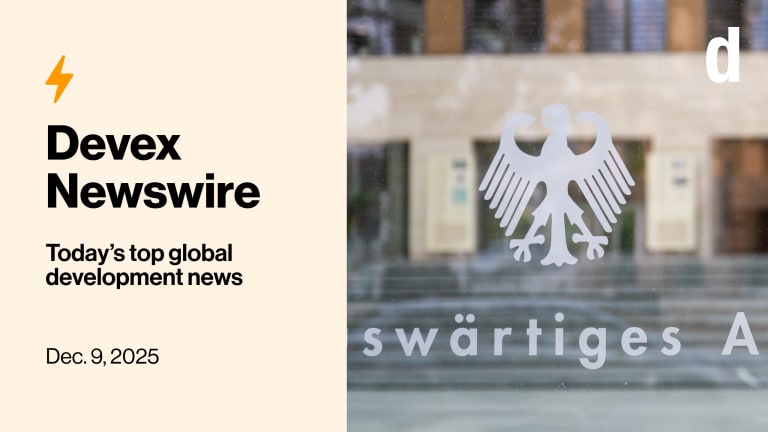
Donors fight to put the Democratic Republic of Congo’s crisis in the spotlight, Oxfam faces more fallout, and the U.K. Department for International Development invites Adam Smith International back to the bidding table. This week in development:
Oxfam bosses were grilled by British members of Parliament for nearly two hours on Tuesday about their handling of the 2011 scandal, which saw a number of senior Oxfam staff sacked, or allowed to resign over allegations they had used sex workers. Oxfam GB's CEO Mark Goldring apologized for the “damage Oxfam has done both to the people of Haiti but also to wider efforts for aid and development," and acknowledged many mistakes were made. He also said the charity had received another 26 allegations since the scandal broke and that 7,000 regular donors had canceled their payments to the charity. Later that day, DFID chief Penny Mordaunt told Parliament the U.K. was taking the lead on cleaning up the aid sector and updated MPs on steps taken to date. DFID announced a U.K. safeguarding summit would take place on March 5 and another, broader conference will be held later in the year. On Tuesday, Mordaunt also met with U.S. Agency for International Development Administrator Mark Green to talk about the safeguarding crisis. This week, CARE International also released its figures on sex abuse cases and Devex spoke with CARE’s interim Secretary General Laurie Lee, who said the scandal-hit industry needs to act decisively to "stamp out something we don’t want to have as part of our sector."
The European Union has put on hold signing new contracts for development projects with all Oxfam affiliates while it assesses the group’s ability to prevent future cases of sexual misconduct, as well as its complaints handling procedures. European Commissioner on International Cooperation and Development Neven Mimica told Devex this week that it was too early to say what kind of heightened scrutiny measures for NGOs could emerge from the review, but he did not rule out a register of aid workers to prevent perpetrators moving between organizations. On Feb. 15, the European Commission wrote to more than 200 EU-funded charities to clarify how they prevent abuse. Mimica said the need to clarify the procedures of organizations that have already been cleared to receive EU funding also signaled a possible need to revise how Brussels approves its implementing partners in the first place.
International aid donors are battling to raise the profile of an underfunded — and worsening — humanitarian crisis in the Democratic Republic of Congo. The European Commission, United Nations, and Dutch government have announced plans to co-host a pledging conference in Geneva in April, with funding needs for the country expected to double in 2018 to $1.7 billion. “In a context where there are multiple, very big crises in the world and humanitarian needs are increasing globally, reaching anywhere near that figure would be a huge challenge,” Androulla Kaminara, a director at the Commission’s humanitarian aid arm, ECHO, told the European Parliament’s Committee on Development. The World Food Programme is currently able to meet only 30 percent of its funding requirements for the next six months, the organization’s DRC country director told Devex Reporter Vince Chadwick this week. The disaster in the DRC combines political crisis, food insecurity, and brutal violence. An estimated 4.1 million people have been displaced, and 7.7 million are food insecure. President Joseph Kabila’s refusal to hold elections and step down from office has fueled political instability, while the 120 armed groups currently in the country make humanitarian access difficult and perilous.
Four big development institutions hosted a first-ever global conference on tax collaboration last week at the U.N. headquarters in New York. The World Bank, International Monetary Fund, U.N., and Organisation for Economic Co-operation and Development are trying to ensure their efforts to help countries raise more tax revenue and cut down on tax evasion are working in support of one another. Both donor organizations and developing country representatives stressed the need for additional capacity building so that tax administration bodies can ease taxpayer compliance and capture more economic activity in their tax systems. “This is a long process. I mean we know that institution building, this is going to take a while, and it has to be steady and sustained over time,” Jan Walliser, the World Bank’s vice president for equitable growth, finance, and institutions, told Devex.
The U.K. Department for International Development has invited Adam Smith International, one of its main contractors, to resume bidding on contracts, one year after the contractor “voluntarily stepped back” from DFID funding when a media report alleged ASI falsified beneficiary testimony and that company staff acquired DFID documents in an attempt to gain an unfair advantage over competitors. While the documents were eventually proven to be innocuous, investigators pressured ASI into a large-scale reform of its governance structure and codes of conduct. The news comes only two months after the company also came under scrutiny by the BBC show Panorama for allegedly funding extremist groups in Syria. An investigation by donors later disproved the allegations and funding resumed to the Free Syria Police programme in late January.
Update Feb. 23, 2018: This article has been updated to clarify the nature of statements about the DRC.




